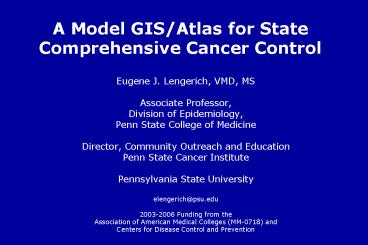A Model GISAtlas for State Comprehensive Cancer Control - PowerPoint PPT Presentation
1 / 27
Title:
A Model GISAtlas for State Comprehensive Cancer Control
Description:
Association of American Medical Colleges (MM-0718) and. Centers ... Roxanne Parrott, PhD. James Hobley, MD. Thomas McGarrity, MD. Juan Wu, MS. Gary Chase, PhD ... – PowerPoint PPT presentation
Number of Views:29
Avg rating:3.0/5.0
Title: A Model GISAtlas for State Comprehensive Cancer Control
1
A Model GIS/Atlas for State Comprehensive Cancer
Control
- Eugene J. Lengerich, VMD, MS
- Associate Professor,
- Division of Epidemiology,
- Penn State College of Medicine
- Director, Community Outreach and Education
- Penn State Cancer Institute
- Pennsylvania State University
- elengerich_at_psu.edu
- 2003-2006 Funding from the
- Association of American Medical Colleges
(MM-0718) and - Centers for Disease Control and Prevention
2
If a picture is worth a thousand words, what is
a definitive map worth?
3
Obesity Trends Among U.S. AdultsBRFSS, 1991,
1996, 2003
(BMI ?30, or about 30 lbs overweight for 54
person)
1996
2003
No Data lt10 1014
1519 2024 25
4
(No Transcript)
5
Specific Aims-Model Cancer GIS/AtlasApplied to
colorectal and prostate cancer in Pennsylvania
- Determine concepts and methods to disseminate a
model GIS/Atlas for state Comprehensive Cancer
Control (CCC) - Develop a model GIS/Atlas
- Investigate individual and contextual factors
associated with the geographic distribution of
cancer incidence
6
1. Concepts and Methods for Dissemination
7
(No Transcript)
8
Assessment of State Comprehensive Cancer Control
Plans 2004/5
- 38 plans available
- 14 (36.8) include mention or use examples of
maps, GIS, atlas, geographic distribution of
cancer - Only 6 (42.9) of the 14 plans had any
interactive mapping potential (15.8 of all plans
available 12.2 of 49 funded states)
9
Diffusion of Innovations
- Relative Advantage
- Compitability
- Complexity
- Trialability
- Observability
- Voluntariness
- Image
- Result Demonstrability
10
2. Model GIS/Atlas
11
Characteristics of Model GIS/Atlas
- Relevant to cancer control issues
- Director-friendly
- Multiple data sources
- Online
- Open-source
- Interactive
- Open standard
12
SEER Prep
SAS
Cancer Prepped Data on Server 1
94-02 Individual-level Incidence Data on Server 1
Individual-level Analysis on Server 1
Juan Wu Gene Lengerich Gary Chase
SEER Stat
Aggregate-level Incidence Data on Server
2 (Geoserver)
Alan MacEachren James Macgill Steven Matthews
Flash
Client
Advisory Committee Dissemination
13
Anatomy of the Colon
14
(No Transcript)
15
(No Transcript)
16
(No Transcript)
17
(No Transcript)
18
(No Transcript)
19
(No Transcript)
20
3. Epidemiological Analysis
21
Is the geographic distribution of the incidence
of ascending colon cancer similar to that for
descending colon cancer?
- Against
- Each screening technique does not have same test
characteristics - Different estimates of the risk and treatment
benefit by cancer site - Reported differences in incidence rate by race
- For
- Both cancers detected by screening
- Similar risk factors and treatment options
22
Relative Incidence of Ascending and Descending
Colon Cancer
23
(No Transcript)
24
Correlation of Colon Cancer Incidencewith
Area-level Contextual Factors,1994-98
Pennsylvania
25
Conclusions
- Maps of health data have driven policy, program
and funding decisions - States have public health authority and
responsibility for cancer prevention and control - A model GIS/Atlas for state Comprehensive Cancer
Control (CCC) can be developed and disseminated - Individual and contextual variability may
contribute to geographic patterns in the
incidence of cancer in subsites of the colon and
rectum
26
Acknowledgements
- Alan MacEachren, PhD
- James Macgill, PhD
- Stephen Crawford, BS
- Matthew Mulbrandon, MS
- Anthony Robinson, MS
- Roxanne Parrott, PhD
- James Hobley, MD
- Thomas McGarrity, MD
- Juan Wu, MS
- Gary Chase, PhD
- Brenda Kluhsman, MSS
- Kelly Bixler, BS
- Association of American Medical Colleges (AAMC)
- Centers for Disease Control and Prevention (CDC)
- Pennsylvania Cancer Control Consortium (PAC3)
- American Cancer Society, PA Division (ACS)
- Pennsylvania Department of Health (PA DOH)
27
Citations for Obesity Maps
- Source BRFSS, CDC.
- Source Mokdad A H, et al. JAMA 199928216.
- Source Mokdad A H, et al. JAMA 200128610.
- Source Mokdad A H, et al. JAMA 20032891.































